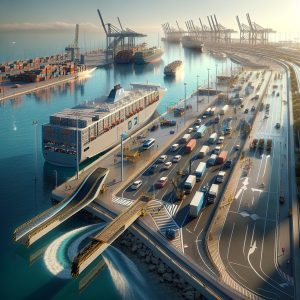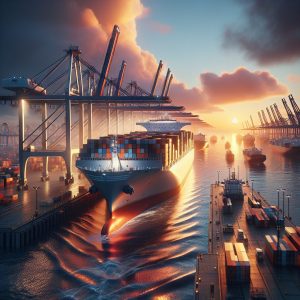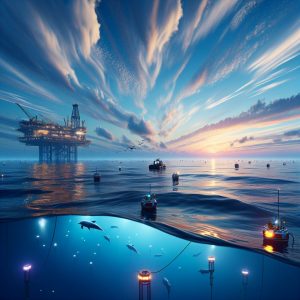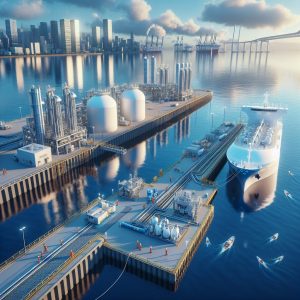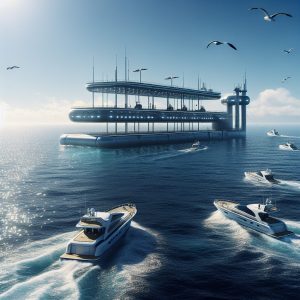The Future of Maritime Transport: The Innovation of the ‘Mercedes Pinto’, the New Fast Ferry by Baleària
The maritime sector is constantly evolving, seeking sustainability and efficiency in each new project. The recent launch of the ‘Mercedes Pinto’, the latest fast ferry by Baleària, marks a significant step towards the future of global nautical transport. Presented on September 19 at the Armon Shipyards in Gijón, this catamaran is not only a technological marvel but also an emblem of innovation and environmental responsibility. With an investment of 128 million euros, this vessel is designed to improve the operational efficiency of the Baleària fleet and stands out for its advanced technological features aimed at reducing environmental impact. These innovations make it a reference point for the shipping industry, promoting a wave of changes that could be decisive for the sector’s future.
Let’s delve deep into the technical characteristics and benefits of the ‘Mercedes Pinto’, as well as its relevance for industry professionals, the job opportunities it generates, and its impact on the local economy. From technical specifications to investment opportunities, the ‘Mercedes Pinto’ is a clear example of how the maritime sector can lead the transition towards sustainability.
Technological Innovations and Environmental Benefits
- The ‘Mercedes Pinto’ stands out for its impressive technological innovations. With 123 meters in length, this catamaran has the capacity to transport up to 1,200 passengers and 400 vehicles, reaching a maximum speed of 35 knots.
- Its propulsion is based on four dual natural gas engines, representing a 30% reduction in CO₂ emissions compared to the use of conventional fuels.
- The fast ferry completely eliminates sulfur and particle emissions, placing it at the forefront of eco-efficiency.
Equipped with azimuth thrusters, it facilitates complex port maneuvers, and an advanced stabilization system enhances onboard comfort by reducing motion. This approach not only increases passenger comfort but also optimizes the vessel’s performance in different weather conditions.
Another significant innovation is the Onshore Power Supply (OPS) electrical connection system, allowing the ship to operate on electricity while docked, minimizing the use of fossil fuels in port. Additionally, it features consumption and efficiency monitoring equipment, ensuring that each journey is as efficient as possible. This technology is attractive not only to technical professionals in the sector but also presents an opportunity for those looking to specialize in clean technologies.
Economic Impact and Job Opportunities
The economic impact of the ‘Mercedes Pinto’ is considerable, not only for Baleària but also for the local community. The construction of this vessel has generated over 250 direct jobs at the Armon Shipyards in Gijón, strengthening the commitment to the local economy and the industrial development of Asturias. Projects like these are crucial to revitalize and maintain the competitiveness of the Asturian industry, demonstrating how the maritime sector can be a driver of regional growth.
For maritime and nautical professionals, the ‘Mercedes Pinto’ represents a significant job opportunity. With the company constantly expanding and modernizing its fleet, Baleària is continually seeking specialized talent in the operation and maintenance of state-of-the-art vessels. Due to its innovative design and features, this vessel requires highly skilled technical personnel. Interested individuals are encouraged to consider submitting their resumes to Baleària and other companies in the sector.
The demand for experts in dual natural gas engines and advanced propulsion systems is increasing, and the ‘Mercedes Pinto’ serves as an example of how innovation can translate into concrete and valuable job opportunities for those willing to sail into the future of maritime transport.
Relevance for Investors and Industry Professionals
For investors in the maritime sector, Baleària has shown with the ‘Mercedes Pinto’ that investment in sustainable technology is not only necessary but also profitable. The significant reduction in emissions and operational cost savings are strong arguments in favor of betting on similar projects in the future. Baleària has demonstrated that a commitment to sustainability can coexist with a lucrative business model.
On the other hand, for sailors and nautical enthusiasts, this launch is a reminder of how the sector is evolving to be more environmentally friendly. Those interested in recreational or sports nautical activities will also benefit from these innovations, as they set a standard that will eventually be reflected in smaller vessels.
Conclusion: A Promising and Sustainable Future
In conclusion, the ‘Mercedes Pinto’ is a clear example of how the maritime sector is taking effective measures to reduce its carbon footprint and improve operational efficiency. This flagship vessel not only represents a step forward in maritime technology but also an opportunity for professionals and investors looking to shape the future of a greener and more sustainable industry.
The positive response from both the market and employees indicates that Baleària is on the right path, leading with social responsibility and environmental commitment. The ‘Mercedes Pinto’ is a source of pride for the Spanish nautical industry and a reminder that with vision and innovation, the future can be as bright as we dare to imagine.

